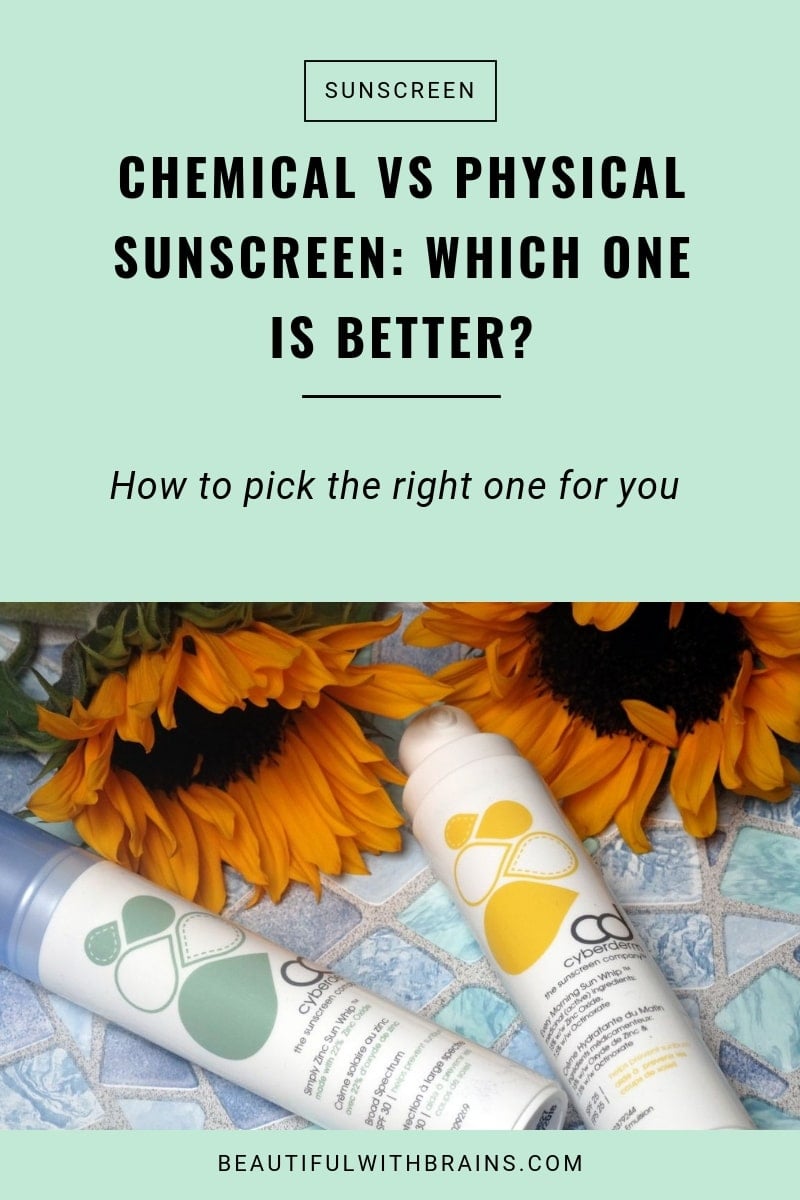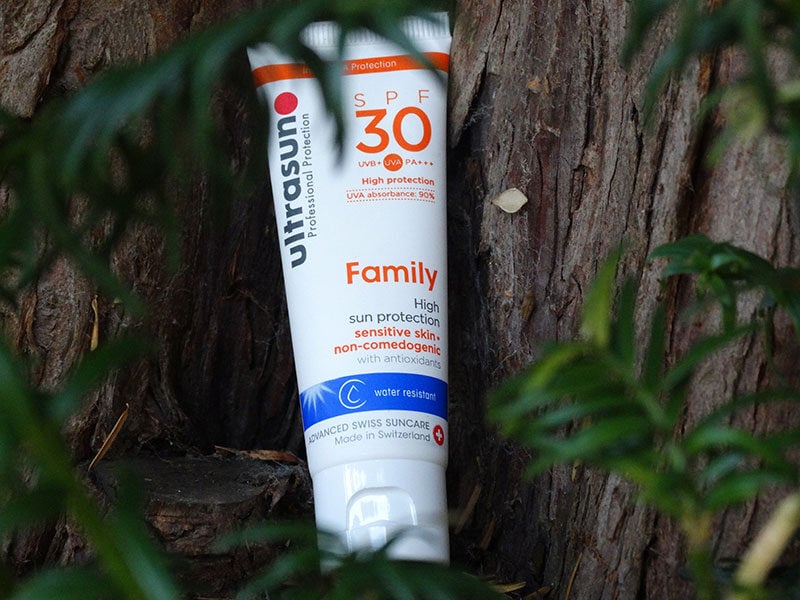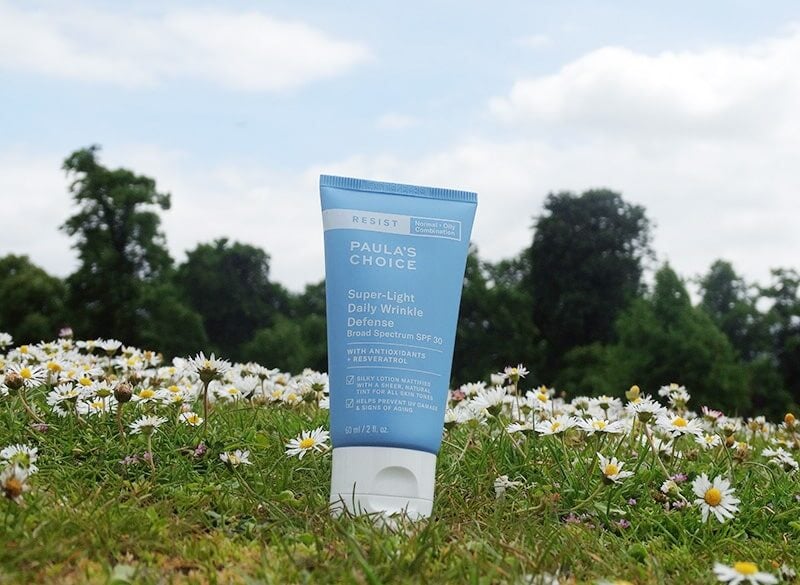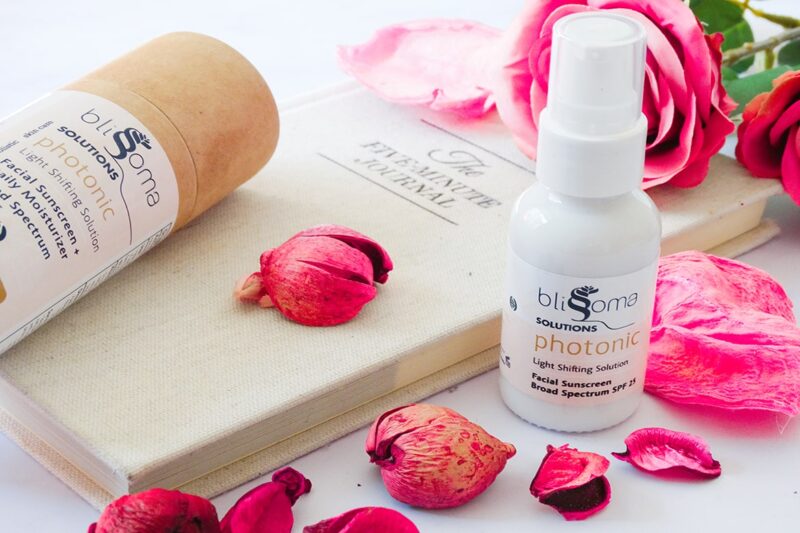
Chemical VS physical sunscreen: which team are you on?
Yep, not all sunscreens are created equal. Some go on like a dream while others are as thick as toothpaste and leave a white mask on your face to boot.
I used to think someone at the lab had screwed up if I got a gooey mess. Now I know they were just trying to do their best with what they’ve got.
Truth bomb: some of the best UV filters are a pain to work with. Typical, isn’t it? But that doesn’t mean you shouldn’t use them.
Sure, you want a sunscreen that’s aesthetically pleasant. But that’s not the whole story. Here’s everything you need to know about chemical and physical sunscreen and how to choose the best one for you:

Chemical VS Physical Sunscreen: Which UV Filters Do They Use?
| CHEMICAL SUNSCREENS | PHYSICAL SUNSCREENS |
|---|---|
| Avobenzone | Titanium Dioxide |
| Homosalate | Zinc Oxide |
| Mexoryl SX and XL | |
| Octinoxate | |
| Octisalate | |
| Octocrylene | |
| Oxybenzone | |
| Tinosorb S and M | |
| Uvinul A Plus and T150 |
A sunscreen is physical (a.k.a. mineral) if it uses only minerals zinc oxide and/or titanium dioxide, as UV filters.
If it only uses the UV filters in the first column, it’s a chemical sunscreen. And if it uses both, it’s a hybrid.
NOTE: ALL sunscreens are technically chemical. That’s because everything that’s made of matter – including water, minerals, and literally every skincare ingredient – is a chemical. Here, we’re using the word “chemical” for sunscreens that don’t use mineral filters.
Related: What Are The Best Sunscreen Ingredients?
How effective is your sunscreen? Sign up to the newsletter below to receive the “Sunscreen Audit” Worksheet and find out if your sunscreen is really up to the job:
Chemical VS Physical Sunscreen: How Do They Work?
| CHEMICAL | PHYSICAL |
|---|---|
| They absorb UV rays | They absorb UV rays |
| They reflect away UV rays |
You probably heard that chemical sunscreens absorb UV rays while physical sunscreens create a shield on the skin that reflects UV rays away from it.
That’s not entirely true. Let me explain.
ALL sunscreens work by absorbing UV rays and transforming them into a less damaging form of energy (heat).
The difference? Chemical sunscreens ONLY work in this way. Physical sunscreens absorb and transform MOST UV rays. The rest (long UVA rays above 360nm), they reflect away from your skin.
Related: 5 Myths About Mineral Sunscreens You Need To Stop Believing Right Now

Chemical VS Physical Sunscreen: What Are Their Benefits?
| CHEMICAL | PHYSICAL |
|---|---|
| Lightweight texture | They’re gentler on the skin |
| Don’t leave a white cast behind | More stable |
| Broader protection |
If texture is important to you, get yourself a chemical sunscreen. Cos no matter how awesome a sunscreen is, if it feels too greasy or makes you look like a ghost, you ain’t gonna use it.
Chemical sunscreens feel so lightweight on the skin, absorb immediately and leave no tell-tale white sign behind. That’s why they’re so popular even in our chemophobic age.
Sensitive skin? You’re better off with a physical sunscreen. For starters, they’re gentler on the skin. They rarely cause allergies and irritations. In fact, they’re so safe, even babies can use them!
I recommend zinc oxide. It protects, on its own, from the entire UV range. Compare that with chemical UV filters. Each of them protects either against UVA or UVB rays. Usually, you need 4 or 5 to keep you safe from all UV rays. The more you use, the higher the chance of an irritation!
There’s another reason why physical sunscreens are better. They’re more stable, so they take longer to degrade in the sun.
Here’s the deal: as UV filters do their duty and absorb/transform/reflect UV rays to make them harmless, they lose a bit of their effectiveness. After 2 hours in the bright sun, most sunscreens are useless. That’s why you need to reapply them often.
Mineral UV filters degrade a little slower than their “chemical” counterparts, so they keep you protected for that little bit longer (but you still need to reapply them often).
Related: How Often Should You Reapply Sunscreen?
Chemical Vs Physical Sunscreen: What Are Their Disadvantages?
| CHEMICAL | PHYSICAL |
|---|---|
| More likely to irritate sensitive skin | Leave a white cast behind |
| More unstable | Can be greasy |
| Can generate free radicals | |
| Protect either from UVA or UVB rays |
Let’s examine all the disadvantages of chemical sunscreens one by one, shall we?
- More likely to irritate sensitive skin: I’m not sure why this happens but UV filters like avobenzone and oxybenzone are known allergens. If you react badly to a sunscreen, one of these filters is usually the culprit.
- More unstable: They degrade quickly under sunlight. For example, avobenzone lasts less than 2 hours on its own. To make it effective for longer, you need to add other UV filters that can help stabilise it. Problem is, more UV filters, more risk of irritation.
- Some UV filters generate free radicals: Free radicals are the nasty molecules that give you wrinkles and dark spots. Octocrylene can generate them. But hey, at least you can fix this by adding an antioxidant serum to your routine (antioxidants neutralise free radicals).
- Usually protect only from UVA or UVB rays: UV filters are one tricky ponies. You have to use a bunch of them to get broad spectrum protection. Again, the more filters you use, the higher the chance of irritation.
PRO TIP: If you go chemical with your sunscreen, make sure it has avobenzone, mexoryl or tinosorb. If it doesn’t, it won’t protect you from UVA rays.
Physical sunscreens have only one downside (and it’s a big one): their texture.
Both titanium dioxide and zinc oxide are thick white minerals so they don’t spread as easily and can give your face a white tint. That makes it hard to apply the generous amount you need to keep your skin safe.
It’s true formulas are getting better. You can find lightweight physical sunscreens that don’t turn you into Caspar The Ghost after he accidentally bumped his head into a frying pan.
But these are still the minority. If texture’s that important to you, go chemical instead.
PRO TIP: If you can’t stand the white cast, go for a tinted physical sunscreen.

Chemical Vs Physical Sunscreen: Which One Is better?
I’m team physical all the way. I love how gentle, yet effective they are. Plus, my skin is so pale, the white cast ain’t a problem for me. But I know lots of experts who favour chemical sunscreens. Again, it’s all because of the texture. If you don’t dig that, you won’t use it.
Do you prefer chemical or physical sunscreens? Share your thoughts in the comments below.

which type do YOU use? 😛
I had NO idea about the free radicals. Oh no! Now I’m wondering – are average store brands (e.g. Coppertone, etc) considered physical or chemical?
I’m torn too. the sunscreen that I’m using now has a chemical sunscreen… *sighs* But I used to use a physical one and it’s soo thick…
jojoba: I prefer physical sunscreen. I’m not fond of the fact their thicker and can leave like a white cast sometimes, but zinc oxide is said to be the best sunscreen ingredients as it protects against the whole spectrum of UVA and UVB rays. With chemical sunscreens you need to read the label very carefully as some ingredients only protects from UVB rays and other only from UVA rays. So you need to make sure it contains both types of ingredients to get a broad spectrum protection.
GHD: Whether a sunscreen is chemical or physical depends on the ingredients, not on the brand. For example, sunscreens that contain titanium dioxide or zinc oxide are physical, while products that contain Mexoryl SX or Avobenzone are chemical. As far as I know most Coppertone sunscreens are not only chemical but also lack suffiecient UVA protection. But it depends on the product really. Copperton has a few chemical sunscreen protecting from both UVA and UVB rays.
Connie: chemical sunscreen feel a lot better on the skin as they’re lighter. Just makes sure you use one that contains protection from both UVA and UVB rays as some don’t offer a broad spectrum protection as they claim.
I use whichever that doesn’t have that strong sunscreeny smell :p
I don’t like that smell either 🙁
I use BestBloc organic sunscreen, it is a physical blocker with no residue and is unscented. Best I have ever used!
http://bestonearthproducts.com/bestbloc_organic_sunscreen.php
Sounds like a good product, I’m glad it works well for you, Tina.
Yes, it works great! Thanks Beautiful 🙂
Tina
Good and you’re welcome, Tina 🙂
Can you suggest a few examples of sunscreen brands that you consider safe. I am using at the moment Ombrelle Extreme 30, La Roche-Posay 60. Both appear to be a combination of physical and chemical. I am thinking of switching to a botanical product from the Arbonne Line.
Also, what brand do you feel is safe for children. I often wonder if it is a good thing that we are slathering these young people with these lotions on a day to day basis.
Hi Penny, the sunscreens you are using isn’t bad but personally I prefr other brands like Soleo Organics Sunscreen Organic chemical free sunscreen SPF 30+, Keys Soap Solar Rx Cosmetic Moisturizing Sunblock SPF 30 and Badger Sunscreen, SPF 30. They all use zinc oxide and are rated among the safest sunscreens by the Enviromental Working Group. You can see the whole list here if you are interested:
http://www.cosmeticsdatabase.com/special/sunscreens2008/findyoursunscreen.php?&sunscreens=1&&start=0
I think it is safer to apply sunscreen on kids as they sun rays can damage their skin too. California Baby and Truekid has some really good and safe sunscreens for children.
I’m concerned about the sun exposure I get while driving. I spend my work day indoors, so my morning sunscreen will not break down due to sun exposure (other than during my half hour morning commute). Is there a reason I should reapply sunscreen before I drive back or my morning application is still protecting me? I would rather avoid ruining my make-up.
The tablespoon amount that you were mentioning above refers to the face only, doesn’t it?
Also, you are saying “Just makes sure you use one that contains protection from both UVA and UVB rays as some don’t offer a broad spectrum protection as they claim.” If reading the label is not helping, then how?
Thanks
Nelly, sunscreen tends to rub off, especially if you’re sweating a little bit (it’s been very hot here this month and I’ve been sweating a bit indoors too even if I didn’t exercise or anything), so I would recommend reapplying it. If you don’t want to ruin your makeup, you can try to retouch it using cosmetics that contain SPF.
Yes, one tablespoons refers to the face. For the entire body (if you’re going to the beach), the recommended amount is an ounce (30ml).
Reading the label does help if you look at the ingredient list. The SPF rating only refers to the protection offered against UVB rays, so sometimes claims can be misleading. Look for sunscreens that contain Titanium Dioxide, Zinc Oxide, Avobenzone (butyl methoxydibenzoylmethane), Mexoryl and Tinosorb at the top of the ingrdient list. All of them protect against UVA rays. I like using sunscreens with Zinc Oxide as it protects from all UVA and UVB rays, or Titanium Dioxide, which protects fom all UVB and most UVA rays too. The others work well too if used with UVB-protecting ingredients.
Oh, I really like the stuff you’re doing:-) Do you think Green Peope’s sunscreens are physical or chemical ones?
Your site is yummy:-)
Spelling error: Green People’s
xoxo Carina.
Carina, I’ve checked their website and their sunscreen seem to contain both physical and chemical sunscreen ingredients.
And thank you, I’m glad you like my blog and hope you’ll stick around. 🙂
You’re welcome,dear. 🙂 I read somewhere, that if you apply product X first(SPF 30) and thereafter product Y(SPF 15) the latter product will interfere with the former one,in which it reduces product X’s SPF Value. Is that correct? How do you apply your sunscreen+foundation?(like,order)
Oh, you seem like a very genuine person, I thank you dearly for answering my weirdo-questions! There are other bloggers out there whose behavior is very arrogant, but you seem truly kind<3 Where are you from? It appears to me that you're from mixed ancestry? lol
Carina, that’s not true. If you apply two products with SPF one after the other, you get the protection of the one with the highest SPF. In your example, if you apply a product with SPF 30 first and then a product with SPF 15, you get SPF 30. The other product you used doesn’t decrease its protection but it doesn’t increase it either. I usually apply my moisturizer first, then my sunscreen and then my foundation.
Aww thank you! I love interacting with my readers and I do my best to answer everyone’s comment and questions. Yours aren’t weird and if you have any doubts, I’m happy to help you out. 🙂 By the way, I’m from Italy. 🙂
Hi, really interesting read.. 2 quick questions for you..
Im reading that SPF30 is more than enough protection but then i’m wondering why there are products of SPF50 and higher. Do you think SPF 30 is enough protection in hot climate or in regular sun following an aesthetic treatment that would leave the skin more exposed and less protected naturally?
I use a chemical sunblock but understand that it may increase free radicals that can lead to skin ageing. The suncreen i use has free-radical scavenger properties and this is suppose to scavenge potentially damaging free radicals. Would you say this balances the disadvantage of chemical suncreen? (because i really like using my current sunblock SPF50 which contains Tinosorb M, Tinsorb S, Octocrylene and Dibenzoylmethane ).
Keith, SPF 30 protects against 97% of UV rays, while SPF 50 against 98% so as you can see the difference is not that much. There are even sunscreen that claim to have higher protection such as SPF100 but none protect against 100% of UV rays. You can use SPF50 if you want that little bit more of protection but usually SPF30 is more than enough.
And yes, if the sunscreen has antioxidants, then they will neutralize any free radicals that could be generated by the chemical sunscreen.
Hi, thank you for the information, really helpfull..
I read that UVA (A = Ageing) UVB (B = Burning) so protection of both is important.
I was reading that EU law suggests that manufacturers of UV products must provide protection of UVA rays of at least 1//3rd of the total SPF (suggesting that SPF30 could give protection of only 10 UVA). They can market these products as SPF30 but if the UVA cover is only 10 then how protected are we from UV Ageing.
My question is how would you describe the benefit (effect on skin over time in relation to ageing) for protecting against UVA-10 Vs. protection of UVA-50 which some products are promoting? (thank you)
Keith, you’re welcome.
The SPF refers to the protection offered against UVB rays. The EU law is a step in the right direction but the point is that sunscreens need to provide broad spectrum protection or they are well, useless. It’s not much a matter of numbers, but of finding a sunscreen that offers protection against the entire UV spectrum. You need to look for products that contain UVA filters at the beginning of the ingredient list or listed separately as active ingredients. Or just purchase physical blockers with Zinc Oxide, which protects against the entire UVA spectrum and thus offers the maximum protection available. But if you use a sunscreen that protects only partially from UV rays, then your skin is going to be damaged. Not as much as if you weren’t wearing sunscreen at all, but still damaged.
Could i ask you personal opinion about using a product that provides the following ingredients and protection:
Tinosorb M & S, Octocrylene & Avobenzone filters SPF 50+ (50-UVA). Also promising skin calming, softening and moisturising (cream, fluid or lotion).
I read Tinosorb M&S are a mineral filters (organic) covering 280-400nm UVA-UVB “the only organic UV filter produced as microfine organic particles (< 200 nm), like microfine zinc oxide and titanium dioxide".
Sorry for so much detail but it's really interesting to get your feedback.. I promise this is the last information suck on this subject 🙂
That sounds like a well formulated product that should offer broad spectrum protection but I would need to see the whole ingredient list just to make sure that there is enough of them to do what they are supposed to do. Especially if it says it contains antioxidants as some products contain too little concentrations of them to be effective. But from what I know atm, it sounds good.
And please, feel free to ask all the questions you want. I’m glad to help if I can. 🙂
Hi Giorgia, thanks agains 🙂
ingredients: Water, Tinosorb M, Tinosorb S, Octocrylene, Avobenzone, Dicaprylyl Carbonate, Cyclomethicone, Potassium Cetyl Phosphate, Glyceryl Stearate Peg-100 Stearate, Propylene Glycol, Tocopheryl Acetate, Glycyrrhetinic Acid, Decyl Glucoside, Disodium EDTA, Phenoxyethanol, Xanthan Gum, Chlorphenesin, Ammonium Acryloyldimethyltaurate-VP Copolymer, Citric Acid, Potassium Sorbate
From what i understand the two main antioxidants are Glycyrrhetinic Acid/Licorice Root (free-radical scavenger and anti-inflammatory) and Tocopheryl Acetate which i read contains Vit E..
What do you feel about the ingredients?
Keith, it is a broad spectrum sunscreen so it will protect your skin well from the sun. But the position of Tocopheryl Acetate and Glycyrrhetinic Acid in the ingredient list makes me think their concentrations are small (around 1%) and their antioxidant benefits limited. I like the sun protection this sunscreen gives and even though the antioxidants in it may not be able to scavenge all the free radicals generated by it, it is always best that not using sunscreen at all. Or you can just fix the problem by applying a moisturizer/serum with antioxidants.
the other question on my mind is. if you have a chemical suncreen providing very high coverage for UVA and UVB and the forumla incldues antioxidants and free radiacal scavenging. What is the disadvantage of using this chemical suncreen over a physical zinx or titanium sunscreen? thanks 🙂
Keith, in this case, it is just a matter of personal preference. Physical blockers can leave a white cast on skin so some people prefer chemical sunscreens instead. As long as they offer broad spectrum protection and antioxidants, they work well.
Thank you Giorgia 🙂
You are welcome. 🙂
Hi Giorgia!
I’ve been watching this DermTV episode on How to Apply Physical Sunscreens and it turns out, you don’t actually need as much physical sunscreen as chemical sunscreen for effective protection. Here’s the link: http://www.youtube.com/watch?v=Zg-xVFvFZc8
Eva, hi and thank you so much for sharing that link. That is so interesting to know. And it’s another reason to love physical sunscreens, which I prefer to chemical ones. 🙂
Chemical sunscreens has been proven to be damaging for coralreefs 🙁 Many now ban these sun blockers (Key West, Hawaii etc). https://www.oceanfdn.org/blog/your-sunscreen-killing-coral-reefs Might be nice doing an 2019-version of this post with this new info? All the best – and thank you for a great blog! /Sanna
Sanna, thank you for pointing it out. I will do more research on what UV filters harm coral reefs and update the post accordingly. 🙂
Did you make a post? What are your thoughts on Aethic Sôvée Triple Filter Eco-Compatible Sunscreen (SPF 25, 40 and 50)? Lots of info about the product, marine science, etc on their website. Apparently zinc oxide can be damaging to coral, too. They are the world’s first reef and marine-friendly eco-compatible sunscreen, apparently. I’ve been tempted to try it, but it’s so incredibly expensive.
Flo, not yet. It’s hard to find accurate information as so many sources are conflicting. This sunscreen uses the new generation of UV filters like Uvinul. If you want to use these filters, you can find them cheaper in Asian sunscreens.